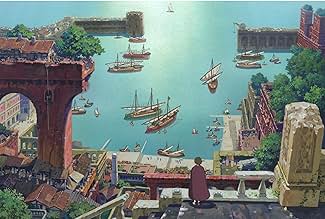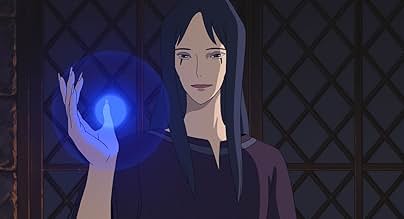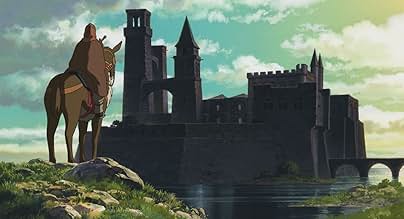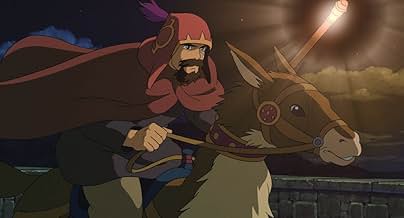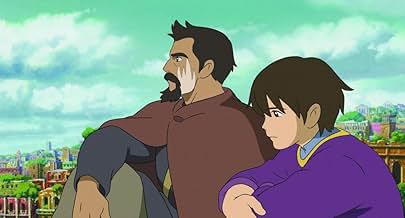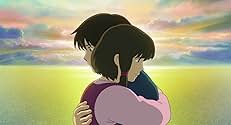In a mythical land, a man and a young boy investigate a series of unusual occurrences.In a mythical land, a man and a young boy investigate a series of unusual occurrences.In a mythical land, a man and a young boy investigate a series of unusual occurrences.
- Awards
- 3 nominations total
Timothy Dalton
- Sparrowhawk
- (voice: English version)
Willem Dafoe
- Cob
- (voice: English version)
Mariska Hargitay
- Tenar
- (voice: English version)
Jun'ichi Okada
- Arren
- (voice)
Aoi Teshima
- Theru
- (voice)
Yûko Tanaka
- Cob
- (voice)
Teruyuki Kagawa
- Hare
- (voice)
Jun Fubuki
- Tenar
- (voice)
Takashi Naitô
- Hazia Dealer
- (voice)
Mitsuko Baishô
- Mistress
- (voice)
Yui Natsukawa
- Queen
- (voice)
Kaoru Kobayashi
- King
- (voice)
Bunta Sugawara
- Haitaka (Gedo)
- (voice)
6.347.5K
1
2
3
4
5
6
7
8
9
10
Featured reviews
A very solid debut from a man standing in a gigantic fatherly shadow.
Better than I expected, a fantastic debut from Goro Miyazaki (son of Hayao Miyazaki) and a worthy addition to Ghibli's consistently brilliant catalog. It follows the prince Arren, as he runs from his kingdom and encounters a wizard named Ged. From here, he is drawn into a classic good versus evil battle. Goro Miyazaki's film bares a lot of similarities to his father's films, but lacks some of the whimsical nature that makes Hayao's movies so distinct. Tales from Earthsea is a more subdued film than films such as Spirited Away and Porco Rosso, and doesn't really hit the emotional or imaginative heights that Hayao Miyazaki's films do. But this isn't always a bad thing - It's simply Goro's style, and this element makes his film a more traditional, perhaps more sensible narrative. Goro has taken a somewhat conservative route with this film - visually and audibly it's classic Ghibli, full of lush environments and excellent animation. In terms of narrative, it carries classic Ghibli (particularly Miyazaki) hallmarks - epic battles of good and evil, cathartic journeys, and the hospitality and grace of ordinary people - but it also has more of a traditional narrative. Good and evil are, unlike many his father's films, clearly defined, and the events of the film lack the extravagance (and imagination) of Hayao's films. It's a wise move - rather than try to re-invent the wheel, Goro has made a wonderfully solid and cohesive film.
To simply compare Goro Miyazaki (and his film) to his father is unfair and sells a great movie short - he has obviously inherited a tremendous flair for storytelling, and with Ghibli's animation team behind him, has created a fantastic debut film. There's another Miyazaki in town - and i can't wait to see where he goes next.
To simply compare Goro Miyazaki (and his film) to his father is unfair and sells a great movie short - he has obviously inherited a tremendous flair for storytelling, and with Ghibli's animation team behind him, has created a fantastic debut film. There's another Miyazaki in town - and i can't wait to see where he goes next.
Suffocated by its source material
Films experiencing production hell are rarely as good as they might have been, no matter how good the director is (c.f. Gangs of New York and AI) and this one is no exception.
Taken on its own terms, Tales of Earthsea is a competent, if not breathtaking, start for Miyazaki junior, and bears comparison to the lesser Gibli canon without scaling the heights of its major work. It is unfair to compare it to My Cousin Totoro, Spirited Away or Graveyard of the Fireflies; but it is also a shame for the fans of Earthsea. They didn't get a top director at the top of his game.
The principal problem with the film is that it doesn't seem to know what to do with the books it is based on. Are they source material to be pillaged? Are they stories to be adapted? Are they concepts to be explored? In the end Miyazaki opts for a mix: the narrative structure is broadly based on the third novel (The Farthest Shore), with a significant sub-plots from both the first (The Wizard of Earthsea) and the fourth (Tehanu). Into the mix he throws some recognisable manga/anime formulae (the arch-enemy; the ronin henchmen; the violence) which cut across the major themes explored by the novels and alluded to by the film.
If this all sounds like a disaster, it isn't exactly. The plot functions: evil wizard, through pride, upsets the balance of Earthsea forcing archmage, Sparrowhawk, in the company of a young prince, to do battle to restore the balance, destroy the evil and face down their own demons. Had Miyazaki been more ruthless all would probably have been well for anime fans anyway. But there are too many blind alleys, lose ends and needless distractions all nods to the books - which make the first half of the film in particular feel like a second rate brass band meandering painfully around a Brassed Off version of Adagio for Strings. The narcotic Hazia, for example, which dominates the beginning of the third story, is introduced early in the film and then simply abandoned. Later, Tenar's back-story fades into nothingness leaving the audience with a forcible impression of a producer impatiently looking at his watch. The whole effect is not homage, but distraction and a film that it is at least 40minutes longer than it needed to be.
Ursula LeGuin, who wrote the Earthsea novels, had suggested to (Hayao) Miyazaki that he create new story for Ged, uncluttered by her previous stories, set in the many years between the first two books. This would have made for a less ponderous film.
Regarding the technical side of animation; it appears the younger Miyazaki was aiming for the dreamlike quality of animation so characteristic of his father's work. Again, he has some partial success in this regard, although it is undeniably more clunky than other Gibli titles. But a lot can be forgiven for his reliance on hand-drawn animation, and there are some moments of real beauty windblown grasses, rocks on the seashore and chill sunsets. This, along with some strong characters and a much tighter second half, make Tales from Earthsea watchable film, if a slightly underwhelming one. But better than Disney. 6/10
Taken on its own terms, Tales of Earthsea is a competent, if not breathtaking, start for Miyazaki junior, and bears comparison to the lesser Gibli canon without scaling the heights of its major work. It is unfair to compare it to My Cousin Totoro, Spirited Away or Graveyard of the Fireflies; but it is also a shame for the fans of Earthsea. They didn't get a top director at the top of his game.
The principal problem with the film is that it doesn't seem to know what to do with the books it is based on. Are they source material to be pillaged? Are they stories to be adapted? Are they concepts to be explored? In the end Miyazaki opts for a mix: the narrative structure is broadly based on the third novel (The Farthest Shore), with a significant sub-plots from both the first (The Wizard of Earthsea) and the fourth (Tehanu). Into the mix he throws some recognisable manga/anime formulae (the arch-enemy; the ronin henchmen; the violence) which cut across the major themes explored by the novels and alluded to by the film.
If this all sounds like a disaster, it isn't exactly. The plot functions: evil wizard, through pride, upsets the balance of Earthsea forcing archmage, Sparrowhawk, in the company of a young prince, to do battle to restore the balance, destroy the evil and face down their own demons. Had Miyazaki been more ruthless all would probably have been well for anime fans anyway. But there are too many blind alleys, lose ends and needless distractions all nods to the books - which make the first half of the film in particular feel like a second rate brass band meandering painfully around a Brassed Off version of Adagio for Strings. The narcotic Hazia, for example, which dominates the beginning of the third story, is introduced early in the film and then simply abandoned. Later, Tenar's back-story fades into nothingness leaving the audience with a forcible impression of a producer impatiently looking at his watch. The whole effect is not homage, but distraction and a film that it is at least 40minutes longer than it needed to be.
Ursula LeGuin, who wrote the Earthsea novels, had suggested to (Hayao) Miyazaki that he create new story for Ged, uncluttered by her previous stories, set in the many years between the first two books. This would have made for a less ponderous film.
Regarding the technical side of animation; it appears the younger Miyazaki was aiming for the dreamlike quality of animation so characteristic of his father's work. Again, he has some partial success in this regard, although it is undeniably more clunky than other Gibli titles. But a lot can be forgiven for his reliance on hand-drawn animation, and there are some moments of real beauty windblown grasses, rocks on the seashore and chill sunsets. This, along with some strong characters and a much tighter second half, make Tales from Earthsea watchable film, if a slightly underwhelming one. But better than Disney. 6/10
A Love Letter with Flaws
Some argue that "Tales from Earthsea" only works if you're not a fan of the novels. I argue the opposite. Studio Ghibli and Goro Miyazaki took on a Herculean effort, creating a massive love letter to Ursula K. Le Guin's beloved series. They approached this film as if it were their only chance to make an Earthsea movie, leading to a final product that, while beautiful, suffers from trying to do too much.
The film struggles to find its footing, with many plot points never receiving the resolution they deserve. This results in a narrative that only makes full sense if you're already familiar with the Earthsea series. For fans like myself, this makes the movie work better as an adaptation of "The Farthest Shore." We see characters from other books making appearances, adding to the richness of the experience. However, for those unfamiliar with Earthsea, understanding the importance of the events and characters can be challenging.
A major disappointment is Sparrowhawk, who feels like a corked bottle throughout the movie. The books make it clear just how powerful and wise he is, akin to Gandalf in "The Lord of the Rings." Unfortunately, the film fails to convey this, depriving the audience of a true sense of his greatness.
Despite these criticisms, I still give "Tales from Earthsea" a 7 out of 10. The animation is stellar, capturing the dark fantasy essence of Earthsea while maintaining Studio Ghibli's recognizable style. It's perhaps the least Studio Ghibli-like film of them all, with its violence and dark tones. The voice performances, especially Willem Dafoe as Cob, are astounding.
The story, though messy, is interesting, and the world-building is incredible. There's a strong commentary on nature and man's greed, a typical Studio Ghibli theme. It's a shame the film didn't achieve the seamless finish it deserved because the potential for an incredible adaptation was there.
In conclusion, "Tales from Earthsea" is a flawed but fascinating film. It stumbles over itself and can't quite find what it truly could have been, caught between a bunch of crossroads. Nevertheless, it remains a beautiful, albeit messy, love letter to Earthsea that I appreciate as a fan of the series.
The film struggles to find its footing, with many plot points never receiving the resolution they deserve. This results in a narrative that only makes full sense if you're already familiar with the Earthsea series. For fans like myself, this makes the movie work better as an adaptation of "The Farthest Shore." We see characters from other books making appearances, adding to the richness of the experience. However, for those unfamiliar with Earthsea, understanding the importance of the events and characters can be challenging.
A major disappointment is Sparrowhawk, who feels like a corked bottle throughout the movie. The books make it clear just how powerful and wise he is, akin to Gandalf in "The Lord of the Rings." Unfortunately, the film fails to convey this, depriving the audience of a true sense of his greatness.
Despite these criticisms, I still give "Tales from Earthsea" a 7 out of 10. The animation is stellar, capturing the dark fantasy essence of Earthsea while maintaining Studio Ghibli's recognizable style. It's perhaps the least Studio Ghibli-like film of them all, with its violence and dark tones. The voice performances, especially Willem Dafoe as Cob, are astounding.
The story, though messy, is interesting, and the world-building is incredible. There's a strong commentary on nature and man's greed, a typical Studio Ghibli theme. It's a shame the film didn't achieve the seamless finish it deserved because the potential for an incredible adaptation was there.
In conclusion, "Tales from Earthsea" is a flawed but fascinating film. It stumbles over itself and can't quite find what it truly could have been, caught between a bunch of crossroads. Nevertheless, it remains a beautiful, albeit messy, love letter to Earthsea that I appreciate as a fan of the series.
A wonderful vision, if not a faithful adaptation
I am a great fan of the LeGuin books, and when I learned that Studio Ghibli was going to be involved in making of the film I eagerly looked forward to its release. I hoped it would make up for the awful SciFi Channel-aired film. The good news in this outing is, there is genuine respect for the source material, even if it is not done genuine honor.
The plot of the film is an amalgamation of elements of several of the Earthsea books, creating a new villain and having characters interact that indeed barely met in the books. While I could not help but feel disappointed by these changes, the film is still visually enjoyable to behold. It does not compare as favorably to Howl's Moving Castle, a story drastically altered from its own source material that still manages to stand on its own as a story.
I could not help but think, as I watched the character Arren develop, why? Why, when there is such wonderful source material, that his introduction came across so muddled and poorly reasoned. I viewed the film with someone who had never read the books, and she really enjoyed it. Despite the film's shortcomings, you generally care for the cast by the end.
The plot of the film is an amalgamation of elements of several of the Earthsea books, creating a new villain and having characters interact that indeed barely met in the books. While I could not help but feel disappointed by these changes, the film is still visually enjoyable to behold. It does not compare as favorably to Howl's Moving Castle, a story drastically altered from its own source material that still manages to stand on its own as a story.
I could not help but think, as I watched the character Arren develop, why? Why, when there is such wonderful source material, that his introduction came across so muddled and poorly reasoned. I viewed the film with someone who had never read the books, and she really enjoyed it. Despite the film's shortcomings, you generally care for the cast by the end.
Too little of Le Guin's story
I am a huge fan of both Ursula Le Guin and Studio Ghibli but the story and the presentation just weren't all they needed to be. The fragments of story they excerpted from the novel lacked cohesiveness, so the characters' stories were truncated and lost. The art work was true to the beauty of Ghibli. I'm disappointed that I can only give this film a 6 (fair) out of 10. {Animated Fantasy}
Did you know
- TriviaHayao Miyazaki first wrote to author Ursula K. Le Guin about adapting her book into a film. LeGuin at the time was unfamiliar with Miyazaki's work, and associated animation to be similar to Disney animation, and turned the offer down. After she saw My Neighbor Totoro (1988), she loved it, and decided to allow the movie to be made.
- Quotes
Haitaka: Now listen to me, Aaren: No man nor any living thing in this world preserves their life forever. But only to men is it given to know that we must die, and that is a precious gift. This life that is both our torment and our treasure was never meant to endure for eternity. Life is a wave on the sea. Would you force the sea to grow still to save one wave? To save yourself?
- ConnectionsFeatured in New York, I Love You (2008)
- SoundtracksSong of Time
Lyrics by Akino Arai and Gorô Miyazaki and music by Akino Arai and Hisaaki Hogari
Performed by Aoi Teshima
Details
- Release date
- Country of origin
- Official site
- Language
- Also known as
- Cuentos de Terramar
- Production companies
- See more company credits at IMDbPro
Box office
- Gross US & Canada
- $48,658
- Opening weekend US & Canada
- $20,614
- Aug 15, 2010
- Gross worldwide
- $68,729,584
- Runtime
- 1h 55m(115 min)
- Color
- Sound mix
- Aspect ratio
- 1.85 : 1
Contribute to this page
Suggest an edit or add missing content




